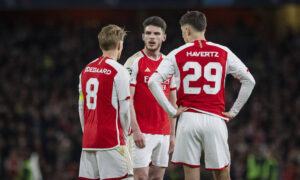“Weakened” has been probably the most over-used word in English football this week. First, the Huddersfield manager, David Wagner, was told he faces an FA investigation after fielding a supposedly under-strength team at Birmingham last Saturday, much to the annoyance of Blackburn and Nottingham Forest, who are competing with Birmingham to avoid relegation from the Championship.
After Huddersfield Town, Five Famously “Weakened” Teams
Then Jose Mourinho used a press conference before Manchester United’s Europa League semi-final with Celta Vigo to suggest that he, too, may pick a “weakened” side for the Premier League match against Arsenal this weekend, as he is prioritising winning the Europa League (and with it qualification to next season’s Champions League) over Premier League points. If he carries through on his threat to pick an under-strength side against Arsenal, it will be fascinating to see whether the FA or the Premier League launch an investigation into his selection similar to the one that Huddersfield face, or whether we will be reminded, yet again, that there is one law for the smaller clubs and another one for the giants.
However, whatever the consequences of their controversial team selections, Wagner and Mourinho will certainly not be the first football managers to select supposedly “weakened” teams. Throughout football history, many managers have felt it necessary, for a variety of reasons, not to put out what would ordinarily be their first-choice team. Here are five famously “weakened” teams.
Arsenal vs. Birmingham in 2003
Football teams can be weakened for many different reasons. As is the case with both Huddersfield and Manchester United at the moment, it is usually because their managers are “resting” players for more important matches ahead. In some instances, however, clubs are unable to put out their best line-ups not because of their manager’s rotation of players but because of bans or suspensions imposed by the footballing authorities. Perhaps the most famous recent example of this type of “weakened” team is provided by the Arsenal squad that turned out against Birmingham in November 2003.
On that occasion, Arsene Wenger was unable to select his first-choice team because of the events at Old Trafford some six weeks earlier, in particular the impersonation of Dracula by Martin Keown that led to a melee between both teams and eventually to the suspension of several key Arsenal players. Keown had been celebrating a late penalty miss by Ruud Van Nistelrooy and he was particularly vehement in doing so because he, like almost all the Arsenal players and fans that day, felt that Van Nistelrooy had dived to win the spot-kick. They also felt that Van Nistelrooy had exaggerated injury earlier in the game to get Arsenal’s captain, Patrick Vieira, sent off.
Consequently, when Van Nistelrooy failed to score from the spot, Keown literally leapt up in the air in delight and came crashing down upon the Dutch striker, who, perhaps surprisingly, remained on his feet rather than trying to win another penalty.
Keown’s actions sparked a mass brawl between the two teams, or more accurately a mass “squaring-up” to each other, which eventually culminated in the suspension of four Arsenal first-teamers, with Ray Parlour and Lauren joining Vieira and Keown in being banned for the game at Birmingham. At the time, many Arsenal fans feared that the suspension of so many vital players – nearly half the first team – would inevitably lead to the loss of points at St Andrew’s. Unlike now, however, in 2003 Arsenal could boast genuine squad depth and goals from Ljungberg, Bergkamp and Pires secured a 3-0 win to maintain their unbeaten record in the league, which would eventually stretch to a record 49 games and secure them the 2003-04 Premier League title.
There are many Arsenal fans today who wish the current Arsenal team or squad would show even a smidgeon of the fighting spirit that “The Invincibles” (as they would come to be known) displayed at both Old Trafford and St Andrew’s. However, that is probably as forlorn a hope as expecting Keown and Van Nistelrooy to exchange Christmas cards.
Liverpool vs. Fulham and Manchester United vs. West Ham United (both in 2007)
In the wake of Huddersfield’s defeat to Birmingham last weekend, which greatly strengthened the Blues’ hopes of remaining in the Championship, the opinion on the subject most keenly sought was the Cardiff manager, Neil Warnock. That was entirely understandable, given that it is almost exactly a decade since Warnock’s Sheffield United were relegated from the Premier League because of what Warnock felt was the fielding of a weakened side not by one opposing manager, but two.
The two managers in question are Rafa Benitez and Sir Alex Ferguson, and when Warnock was asked about the Huddersfield situation this week he admitted that the events of ten years ago still left “a bad taste in the mouth”.
There is no doubt that Sheffield United’s relegation at the end of the 2006-07 season was one of the unluckiest, indeed one of the unfairest, that any club has ever experienced in the history of the English top flight. The main bone of contention for Warnock and his men was West Ham’s acquisition at the start of the season of Carlos Tevez and Javier Mascherano, two Argentine World Cup stars who were later proved to be partly owned by a third party, namely the agent Kia Joorabchian, in clear contravention of FA rules on third-party ownership of players.
Ultimately, West Ham survived in the Premier League at the expense of Warnock’s Blades, with Tevez scoring the crucial winning goal in the final game of the season to keep them up. However, Warnock has always argued that if Benitez and Ferguson had picked full-strength sides against Fulham and West Ham respectively, Tevez’s goal would have been an irrelevance, as West Ham, or perhaps even Fulham, would already have been relegated.
Benitez fielded a seriously under-strength Liverpool side away at Fulham because he was resting his first-choice players for a more important game, namely the Champions League final against AC Milan (a rematch of the classic 2005 final, which Liverpool had won on penalties). Fulham themselves were embroiled in the relegation battle, but faced with such a weakened Liverpool side, they won 1-0 and eventually scrambled to safety.
It is unlikely that Warnock is an admirer of Oscar Wilde, but if he was he would surely have paraphrased the great man’s most famous quotation: “To have one top manager put out a weakened side against a relegation rival can be considered unfortunate; to have two do it looks suspicious”.
Effectively, that was what happened as Manchester United, who had already been crowned champions, fielded a weakened line-up against West Ham at Old Trafford in the final game of the season. To make matters worse, while Liverpool had at least rested players for a key match, it seemed that Sir Alex Ferguson had left several key players on the bench (including a young Cristiano Ronaldo) either because he wanted to try out some fringe players or, as it was alleged by some in Manchester, some players had overdone the title celebrations and were in no fit state to play. Either way, Tevez scored to keep West Ham up and send Sheffield United down, and even when West Ham were later forced to pay the Blades millions in compensation, it was no consolation.
West Germany vs. Hungary (first round of the 1954 World Cup)
West Germany met Hungary twice at the 1954 World Cup in Switzerland, but effectively the Hungarians faced completely different opponents in the two games. That was because West Germany’s coach, Sepp Herberger, deliberately rested some of his key men in the first round meeting between the two sides. In effect, he “threw” that match, believing that his side could still qualify for the knockout stages by achieving results against opponents who were weaker than Hungary. And he was right.
In 1954, Hungary were the undoubted favourites to win the World Cup. Unbeaten for nearly four years, a period that had taken in the two legendary thrashings of a supposedly unbeatable England side, they were rightly called “The Magical Magyars” and when they opened the tournament by dominating South Korea 9-0, their status as tournament favourites appeared completely justified. West Germany also won their opening match in the group, beating Turkey 4-1, but when the two sides met in their final group match, controversy ensued.
FIFA has recently announced the expansion of the number of teams competing at future World Cup finals to 48, with 16 groups of three. However, lest anyone should think that such mismanagement of the World Cup is the sole preserve of modern-day FIFA, they should examine the entire history of the tournament. The World Cup has often been mangled and mistreated by FIFA and the format of the 1954 tournament is a classic example.
Although there were four groups with four teams in each group, in the first round each team only played twice rather than three times. That meant that when West Germany faced Hungary in their final first-round match, they had no hope of racking up the goals that Hungary had scored against South Korea. Consequently, the German coach, Sepp Herberger, decided to rest several key players for the Hungary game, knowing that even if they lost they would still have the safety of a play-off game against Turkey, the team they had already defeated, to qualify for the quarter-finals.
As a result, the first encounter between Hungary and West Germany in 1954 ended in an 8-3 win for the Hungarians. However, it was to prove the most Pyrrhic of victories, as a German defender, Werner Liebrich, kicked Ferenc Puskas, the Hungarian captain and talisman, out of the match. When the two sides met again a fortnight later in the World Cup final, Puskas was still injured and West Germany upset the odds to win 3-2. Thus, the most controversial fielding of a “weakened” side in World Cup history ultimately proved to be justified.
England vs. West Germany (World Cup quarter-final, 1970)
Often, the worst wounds are those that are self-inflicted, and that is as true in football as it is in life. Thus, the worst weakening of a team in football history is arguably that inflicted on England by their own manager, Alf Ramsey, in the 1970 World Cup quarter-final against West Germany, which ultimately cost them any chance of defending the title they had won so magnificently in 1966.
It is almost impossible now, after the half-century of failure on the international stage that has followed the 1966 World Cup win, to think of England as reigning World Champions, but that is exactly what they were in Mexico in 1970. Moreover, several football writers at the time thought that the 1970 squad, which included players like Brian Labone and Colin Bell who had not played on home soil four years previously, to be superior to that of 1966. Certainly that case could be made as England advanced to the quarter-finals relatively easily, only losing to Brazil, and narrowly at that.
As a result, when England took a 2-0 lead against West Germany in that last-eight game, it appeared inevitable that they would go on to reach the semi-final. In the end, however, England lost after Alf Ramsey made what is undoubtedly the most controversial substitution in English football history and arguably the worst.
As the game neared its conclusion, England seemed in complete control after goals by Alan Mullery and Martin Peters. However, in the 68th minute, West Germany’s own star midfielder, Franz Beckenbauer, got a goal back. Ramsey then made the fateful decision to take off Bobby Charlton and replace him with Manchester City’s midfield dynamo, Colin Bell. At the time, it seemed completely logical.
Bell was much younger and fitter than the veteran Charlton and in the near-volcanic heat of the Mexican summer, Ramsey thought it best to introduce fresher, younger legs than those of the ageing Charlton. However, Ramsey had not reckoned on the effect the substitution would have on West Germany, and in particular on Beckenbauer.
Beckenbauer had been assigned to man-mark Charlton throughout the game, but despite his best efforts, Charlton had helped England into a commanding lead. However, as soon as Charlton left the pitch, Beckenbauer was freed from his defensive duties and subsequently led the West German fight-back, which culminated in an 82nd-minute equaliser by Uwe Seeler. The match went into extra-time and in a grim foreshadowing of almost all the subsequent meetings between the two countries, particularly at World Cups, West Germany’s great striker, Gerd Muller, got the winner in the 108th minute.
It must be stressed that it was not just Ramsey’s decision to substitute Charlton that cost England the game. England had already been greatly weakened by the loss of Gordon Banks, their great goalkeeper, to illness, and his replacement, Peter Bonetti, was badly at fault for Beckenbauer’s goal. Nevertheless, Ramsey’s decision to replace Charlton, one of his other stalwarts, especially as it came so soon after Germany had got a goal back, compounded the loss of Banks.
It meant that England had effectively lost half the spine of their team – their goalkeeper and their midfield general – and could not respond when West Germany came back at them.
David Wagner and Jose Mourinho may yet be punished for fielding supposedly “weakened” teams, perhaps even by the deduction of points. However, the consequences of their actions are unlikely to be as grave as those suffered by the whole of English football ever since Alf Ramsey’s fatal weakening of his own side in 1970.
Main Photo:






